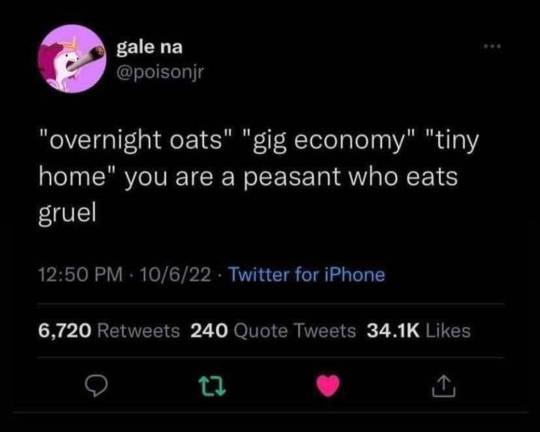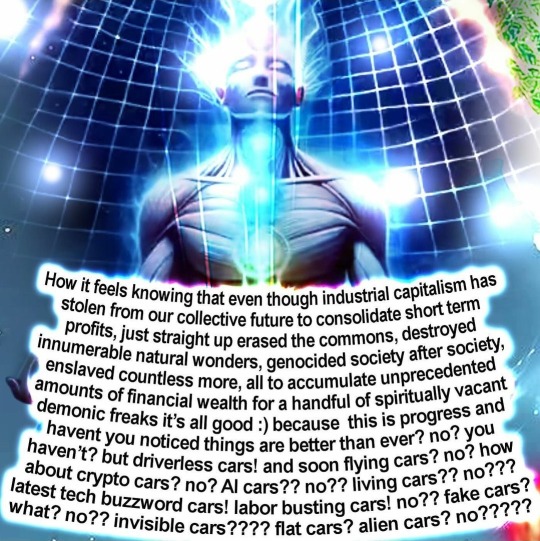#degrowth
Text
Unions are focused on increasing employment and improving livelihoods, but they too often assume that the only way to do this is to step on the accelerator of growth, even in the face of the climate emergency, to the point of lobbying to expand airports and prevent the closure of coal mines. There is another way. Unions should fight to shorten the working week and introduce a public job guarantee to enable anyone to train for and participate in socially important and ecologically regenerative work, with a living wage. This would permanently solve the question of employment and livelihoods. Such measures can and should be introduced alongside a guaranteed income for those who cannot work or who for whatever reason choose not to, along with a full range of universal public services. All of this can be funded in the manner that Modern Monetary Theory proposes, and by distributing national income more fairly, with wealth taxes and maximum income ratios.
Jason Hickel | Stéphane Hallegatte, Can we live within environmental limits and still reduce poverty? Degrowth or decoupling?
85 notes
·
View notes
Text
hey uh so I haven't seen anyone talking about this here yet, but
the amazon river, like the biggest river in the fucking world, in the middle of the amazon fucking rainforest, is currently going through its worst drought since the records began 121 years ago

picture from Folha PE
there's a lot going on but I haven't seen much international buzz around this like there was when the forest was on fire (maybe because it's harder to shift the narrative to blame brazil exclusively as if the rest of the world didn't have fault in this) so I wanted to bring this to tumblr's attention
I don't know too many details as I live in the other side of the country and we are suffering from the exact opposite (at least three cyclones this year, honestly have stopped counting - it's unusual for us to get hit by even one - floods, landslides, we have a death toll, people are losing everything to the water), but like, I as a brazilian have literally never seen pictures of the river like this before. every single city in the amazonas state is in a state of emergency as of november 1st.


pictures by Adriano Liziero (ig: geopanoramas)
we are used to seeing images of rio negro and solimões, the two main amazon river affluents, in all their grandiose and beauty and seeing these pictures is really fucking chilling. some of our news outlets are saying the solimões has turned to a sand desert... can you imagine this watery sight turning into a desert in the span of a year?


while down south we are seeing amounts of rain and hailstorms the likes of which our infrastructure is simply not built to deal with, up north people who have built everything around the river are at a loss of what to do.
the houses there that are built to float are just on the ground, people who depend on fishing for a living have to walk kilometers to find any fish that are still alive at all, the biodiversity there is at risk, and on an economic level it's hard to grasp how people from the northern states are getting by at all - the main means of transport for ANYTHING in that region is via the river water. this will impact the region for months to come. it doesnt make a lot of sense to build a lot of roads bc it's just better to use the waterway system, everything is built around or floats on the river after all. and like, the water level is so incomprehensibly low the boats are just STUCK. people are having a hard time getting from one place to another - keep in mind the widest parts of the river are over 10 km apart!!

this shit is really serious and i am trying not to think about it because we have a different kind of problem to worry about down south but it's really terrifying when I stop to think about it. you already know the climate crisis is real and the effects are beyond preventable now (we're past global warming, get used to calling it "global boiling"). we'll be switching strategies to damage control from now on and like, this is what it's come to.
I don't like to be alarmist but it's hard not to be alarmed. I'm sorry that I can't end this post with very clear intructions on how people overseas can help, there really isn't much to do except hope the water level rises soon, maybe pray if you believe in something. in that regard we just have to keep pressing for change at a global level; local conditions only would not, COULD NOT be causing this - the amazon river is a CONTINENTAL body of water, it spans across multiple countries. so my advice is spread the word, let your representatives know that you're worried and you want change towards sustainability, degrowth and reduced carbon emissions, support your local NGOs, maybe join a cause, I don't know? I recommend reading on ecological and feminist economics though
however, I know you can help the affected riverine families by donating to organizations dedicated to helping the region. keep in mind a single US dollar, pound or euro is worth over 5x more in our currency so anything you donate at all will certainly help those affected.
FAS - Sustainable Amazon Fundation
Idesam - Sustainable Developent and Preservation Institute of Amazonas
Greenpeace Brasil - I know Greenpeace isn't the best but they're one of the few options I can think of that have a bridge to the international world and they are helping directly
There are a lot of other smaller/local NGOs but I'm not sure how you could donate to them from overseas, I'll leave some of them here anyway:
Projeto Gari
Caritás Brasileira
If you know any other organizations please link them, I'll be sure to reblog though my reach isn't a lot
thank you so much for reading this to the end, don't feel obligated to share but please do if you can! even if you just read up to here it means a lot to me that someone out there knows
also as an afterthought, I wanted to expand on why I think this hasn't made big news yet: because unlike the case of the 2020 forest fires, other countries have to hold themselves accountable when looking at this situation. while in 2020 it was easier to pretend the fires were all our fault and people were talking about taking the amazon away from us like they wouldn't do much worse. global superpowers have no more forests to speak of so I guess they've been eyeing what latin america still has. so like this bit of the post is just to say if you're thinking of saying anything of the sort, maybe think of what your own country has done to contribute to this instead of blaming brazil exclusively and saying the amazon should be protected by force or whatever
#solarpunk#sustainability#environmentalism#climate change#climate crisis#global warming#amazon rainforest#amazon river#geography#brazil#degrowth#punk#global boiling#ecopunk#anti capitalism#climate action#climate activism#the world does not die on my watch#i saw someone use that tag and uh i like it we should make it a thing#long post#:/ sorry i know no one likes lengthy bad news posts on their dashes but i've been thinking about this quite a bit#and i don't really know what to do to help bc i don't have money to donate and i am 10 thousand km away#i think i could be doing more to help but i am already trying my best#again dont feel obligated to share or read this but it would be nice and i would love you forever#have removed lbv from the post
7K notes
·
View notes
Text
Breaking news from Panama! 🟢
In a historic vote, the nation’s highest court today ruled the Minera Panamá mining contract for an open-pit mine unconstitutional, marking a WIN for biodiversity, local communities, and our planet.
Panama has an opportunity now to be a leader in safeguarding precious ecosystems and protecting biodiversity. This ruling champions the rights, voices, and well-being of local communities over profit-driven interests.
This victory is also a beacon of hope for our planet’s future. Safeguarding irreplaceable ecosystems like these is critical to combatting climate change and biodiversity loss. Congratulations to the people of Panama, who overwhelmingly rejected profit over planet. We continue to stand with you!
Video credits:
Collaboration between @duletvindigena @waguafilms @mullu.tv & Passu Creative Community
Indigenous Protester - TV indígena and waguafilms
Great Green Macaw - Hans Norelius, CC BY 2.0
Gemini's Dart Frog Jaime Culebras / @photowildlifetours
#PanamaTeQuieroVerde
#PanamáValeMásSinMinería
#panama#central america#latin america#abya yala#environmental justice#climate justice#ecology#anti imperialism#extractivism#neocolonialism#anti colonialism#indigenous rights#degrowth#i'm so happy for my country 😭❤️
531 notes
·
View notes
Text
So, like, universal basic income.
One of the things I’ve heard people say is how, you know, you need income as a motivation to make people work. And I’ve heard some great arguments against that.
But also.
There are a lot of low-paid jobs that actually make the world a crappier place. Like, if we could just pay everyone in the fast fashion industry to stay home and not go to work, the world would be a much better place. If we paid people enough that they didn’t need to work in factories, then large-scale manufacture of crappy stuff wouldn’t be feasible anymore.
Like, we’re basically in a post-scarcity society. We have more than enough food and clothing for everyone. This manic capitalist mindset where we force people to go to jobs they hate to remove value from the world is insane, right?
And maybe if we instituted this we’d lose fast food corporations and stuff. But I bet they’d be replaced by small restaurants run by people who are passionate about what they do.
932 notes
·
View notes
Text

#dark academia#light academia#anti capitalism#abolish capitalism#neofeudalism#neoliberalism#neoliberal capitalism#unionize#eat the rich#activism#vote#antiwork#collapse#sustainability#degrowth#socialism
482 notes
·
View notes
Text
I do actually think that people should learn what "no ethical consumption under capitalism" really means before they just thoughtlessly repeat it whenever they don't want to even think about the harm caused by some item's production.
Like look it up!! Pick a random product that's a staple of your life and find out who is exploited and what environmental harm is done by its sourcing and processing and distribution. Find out the real, human and environmental cost of something that feels necessary to you.
Then look up the alternatives. Try to find a version that doesn't harm people or the environment. Struggle with the way corporations work hard to keep these harms secret and realize most of what we actually know is only public because activist groups raised the alarm.
Pick another item. And another. Let it really, really sink in what it means that you cannot live under capitalism without being complicit in harm. That "no ethical consumption" is not just a catchphrase to get out of caring.
And now think about how you could contribute, in however small a way, to protecting the people and environments that get destroyed for the products you rely on.
#thatdiabolicalfeminist#capitalism#no ethical consumption under capitalism#degrowth#is a pretty obvious necessity after doing this kind of research
613 notes
·
View notes
Text
People are so propagandized under capitalism that they'll reinvent leftist ideas without knowing it. I've seen a "right libertarian" describe what he wanted for his economic system, and it was degrowth.
#196#my thougts#leftist#leftism#socalism#socialism#marxism#degrowth#ancap#libertarian socialism#anti capitalism#anti capitalist
341 notes
·
View notes
Text
The historical record demonstrates that dramatic progress on welfare indicators occurred in the core economies after 1880, with the rise of the labor movement, social democratic parties, and movements that secured suffrage for working men and, later, for women. These gains accelerated in the early/mid twentieth-century, delivering extremely high welfare ratios. It is crucial to understand that the gains during this latter period were due not only to progressive movements within the core, but also to socialist movements in the periphery, which were (especially in the case of the USSR) demonstrating that socialist and communist alternatives were possible. The rise of socialism in the East inspired socialist movements in the West (most famously in Germany, which came to the brink of a socialist revolution during the Spartacist and Ruhr uprisings of 1919–20). These revolutionary movements posed a real threat to capitalism in the core. Capitalism survived in part by crushing these movements—quite often violently, but also by making concessions to working-class demands, including wage improvements and some public services, although never conceding to the core demands for decommodification and economic democracy. Thus, the rise of the social democratic welfare state.
Capital accumulation requires cheap labor, however, and these concessions would have brought capitalism in the core to its knees were it not for the fact that capitalists were able to obtain cheap labor instead in the periphery, through colonial and neocolonial forms of appropriation, which continue to this day.10 The unique privilege of imperialism allowed capital in the core to maintain accumulation despite concessions to its working classes—a privilege that is not available to most states in the periphery.11 This is what explains the extreme disparity that persists between social indicators in the capitalist core (where the average welfare ratio of an unskilled laborer is 10–20) versus those in the capitalist periphery, where the average welfare ratio is less than 2, and where in many cases wages and/or heights have not recovered from the immiseration caused during the period of capitalist integration.12 To understand the relationship between capitalism and human welfare today, we must look at living conditions in the capitalist periphery.
Of course, the core could have taken a different direction. It could have accepted the demands of workers and anti-imperialist movements, abandoned the imperatives of capital accumulation, and transitioned to a postcapitalist system—thus achieving social progress without imperialism. Social progress does not require imperialism. Capitalism does.
Capitalism, Global Poverty, and the Case for Democratic Socialism by Jason Hickel and Dylan Sullivan
128 notes
·
View notes
Text

Society If Text Wall bringing the heat as always: another post perfectly summarizing the delusions of the "growth for the sake of growth" mindset.
92 notes
·
View notes
Text

another hazbin hotel rewrite/redesign?
yup! and i'm so serious about it that i made a whole blog for it. i'm a white queer ex-cath tran doing this as an art and writing exercise, so feedback from other creatives + jewish and/or racialized folks is especially welcome.
i'm putting this post and only this post in the main tags for visibility. also, not gonna link my main, but i do make my own original stuff, and i encourage fans and haters alike to do the same.
anyway, here's a mostly good-faith 1.7k-word essay on the original. i think it's pretty funny and brings up some less talked-about points. correct me on the facts, disagree with my opinions, and ask clarifying questions, but don't come at me with any piss-poor reading comprehension.
the hellaverse is garbage, and here's why
cw: strong language, stronger opinions, intersectional feminist critical discourse analysis
1. vivienne medrano, the person
medrano was born as a well-off white-passing latina (salvadoran-american) in bougieass frederick, maryland. while attending new york's top art school, she got popular on deviantart-tumblr-twitter by being a prolific multifandom fujoshi furry who's more into ornamental character design than storytelling. upon graduation, she leveraged her fanbase and industry connections to make the hazbin and helluva boss pilots, get helluva made for youtube, and get hazbin made for amazon prime.
like every woman online, she gets harassed for no good reason, and as a certified autist, i will defend her right to be dumb, weird, annoying, and bad with words. however, there are legit reasons to criticize her:
racism, misogyny, homophobia, fatphobia, some antisemitism, past transphobia, past ableism
shitty boss, bad friend
cowardly, vindictive, manipulative, thoughtless behavior
skeevy friends
sucks at taking criticism
in short, i think she desperately needs a PR person and someone to clean up her digital footprint.
2. medrano's art
incurious
inauthentic
noncommittal
creatively stagnant
overindulgent, and the indulgence isn't even fun
shallow and childish framed as complex and mature
bland and boring framed as shocking and subversive
to be clear, i'm at peace with the existence of suckass art like this; i just think the money, attention, and praise it gets are unearned and should go to more interesting works, of which there are infinite.
medrano's had the time, money, and social cache to grow as an artist, learn from the best, and take creative risks, but she hasn't. if she truly has nothing more to offer, she should let her collaborators take the wheel, but she doesn't do that either. instead, she keeps getting more and more resources to make the same baby bullshit, and that pisses me off. she could be the nicest person ever, and this fundamental arrogance would still make her art blow.
stop with the pointless guilt: liking medrano's work does not make you stupid or evil. however, if you stay in the kiddie pool of culture, if you refuse to engage with a diversity of art, if the hellaverse is your point of reference for anything media-related, you can't expect to have your opinions on art, media, or culture taken seriously. you have not earned a seat at the table. you gotta hit the books first.
i cannot emphasize enough how much incredible stuff is out there if you're willing to look further than what social media and streaming services put right in front of you. if you come away from this blog having learned about just one new artist or piece of art, i'll be a happy camper.
3. the hellaverse
a. empty and confused
hazbin and helluva's content and marketing has no clear target audience. the subjects are inappropiate for teens, but the execution is too childish for adults, and lemme tell you what i don't mean by that, first.
not inherently inappropriate for teens:
sex and sexuality
violence, including when it intersects with the above
politics and religion
not inherently childish:
animation (any style)
comedy
episodic writing and/or loose continuity
young characters
fun, happiness, optimism, the power of friendship, cuteness, tenderness, sincerity, etc.
what i mean is that these shows are literally about adult characters who fuck, smoke, drink, do drugs, go clubbing, work full-time, manage their own finances, and deal with stuff like bureaucracy, sexual violence, domestic abuse, marriage, divorce, late adoption, and family estrangement.
however, none of these "adult" things are given enough specificity to create drama or comedy. it's all too stock, vague, flat, weirdly sanitized, and thus utterly banal—pure aesthetics on top of bad saturday morning cartoons. it's exactly what i'd expect from a sheltered disney kid who needs to log off and get into their local gay scene ASAP so their only contact with things like poverty, policing, addiction, and sex work stops being facile movies and TV.
if the shows were aware of this and played with it, that could be amazing, but they're not. they give you the mickey mouse version of the world with a straight face and then play looney tunes sound effects to try to make you laugh and sad_violin.mp3 to try to make you cry. now that's funny.
b. old and tired
let's make like americans and pretend that the rest of the world doesn't exist. even within the confines of the USA, home of the hays code, the red scare, and reaganite propaganda, this neopuritan fascist state ruled by 1000 megachurches in a trenchcoat, the indie/underground animation scene has been doing crazier shit for decades. anti-war films in the 60's, bakshi movies in the 70's, the simpsons shorts and r-rated movies in the 80's, adult swim and MTV in the 90's, flash/newgrounds/youtube in the 00's, streaming in the 2010's—so what are we doing in the 2020's with this wet white rice drowned in expired ketchup? i feel crazy making this point because it's obvious if you've watched these things, but if you haven't, you're gonna be like "well, there's gotta be something new here". no! there isn't! in the words of jimmy "the scot" jordan, nothing, nothing, NOTHING!
c. ideological purgatory
actually, there is one thing in these shows i've never seen before: the presbysterianism. shout out some interesting or at least intentional presbysterian art in the comments, because the way these ideas are presented here is not compelling. it just makes the rainbow neoliberalism even more confusing and contradictory.
i guess the big presbysterian things are protestanism, calvinism, and, uh, big church government? presbysterians, get your shit together. get your brand down. catholics have BDSM and vampires, evangelicals have TV and corporatism; what do you have? celtic crosses? no wonder medrano has such uninspired ideas on divinity.
d. queer deficiency
when i look at a piece of art, i ask myself: "what does this give me that i can't get from the hunchback of notre dame (1996)?" if the answer is as limp as "uhh, gay people, i guess", i can probably look for my gay shit elsewhere and rewatch the hunchback of notre dame (1996) in the meantime.
but let's say that you have no standards. you've been waiting for ages for a show about gays by the gays for the gays, and by god you're gonna get it. this is it! here we go! time for some
generic twink obliteration
male sexuality as aggression and dominance displays
WLW (sex and chemistry not included)
a couple straight femdoms
and the stalest sex jokes known to man
...yeah, it's not very queer. and by "queer", i mean "questioning or subverting gender norms (including sexual roles) within a given cultural context regardless of creator identity and intent". i'm not a queer studies scholar so LMK if there's a more specific term for this, but whatever you call it, it's not in the hellaverse much.
there's not even any transness, literal or metaphorical, just ancient drag jokes. i guess the writers thought we would've been too controversial. so much for an indie animation studio that prides itself in the diversity of its staff both above and below the line, bakshi-style. i wonder how medrano, a bisexual woman, would've felt if told that a lesbian main couple in hazbin would be "too controversial".
4. spindlehorse and the vivziepop brand
spindlehorse toons underpays its overworked staff and keeps outsourcing more and more labor to even more overworked freelancers overseas to cut costs. a rainbow sweatshop is still a sweatshop, and just because these practices may be "industry standard" doesn't make them any more ethical.
the studio has also been repeatedly accused by current and former employees and contractors of creating a hostile and abusive workplace. AFAIK, it still has no dedicated HR person, and victims are too afraid of retaliation like blacklisting and online harassment to speak out.
this is exactly the stuff that unions exist to prevent. as i'm writing this, the IATSE (the parent union of TAG, which is the parent union of all US animation unions) is negotiating with entertainment industry executives for better working conditions, and if the execs fuck around like last year, it's strike time again. so watch this space, voice your support, and don't cross any picket lines.
i hope spindlehorse unionizes, but until then and for these reasons, i don't think you should give money to the company.
first of all, all content on amazon-owned platforms is ok to pirate, and all youtube ads are ok to block. everyone involved in making the episodes has (or should have) been paid upfront, so you're not taking the bread out of anyone's mouth.
next, let's look at the succulent offerings of the official vivziepop merch shop:
$10 pins and keychains
$15 sticker packs
$20 mugs and acrylic cutouts
$25 shirts
$30 metal cards (not even tarot)
$40 lounge pants
$50 mini backpacks
random $80 skateboard deck
forgive my latin americanness, but this is all stuff you can get made by a local metalsmith, print/sublimation shop, or just crafty people in your life. it's cheaper, customizable, and better for the environment to skip all the shipping and packaging. also, not painting your own skateboard is poser shit.
the hazbin website also has $15 pins, one $20 keychain, and $6 trading card packs. people are weird about trading cards, so if for some reason you wanna gamble for a mass-produced bit of cardboard, plastic, and tinfoil, at least bulk-order for all the vivziepoppers in your area so it's less of a huge waste. better yet, trace the designs and make infinite bootlegs.
at the end of the day, buying merch is not activism. your bulk order of trading cards will not save any wage slaves from getting evicted from their overpriced studio apartments. however, the shop links you to all the credited artists/designers, and more of your bucks will actually reach them if you buy their designs directly, then turn them into body pillows or life-sized bronze statues or whatever the fuck.
go through the credits of any episode of helluva or hazbin, and you'll find even more creatives you might wanna support. get jinkx monsoon's albums on CD. subscribe to actually good artist, animator, and composer gooseworx. lots of voice actors now have patreon, cameo, or self-hosted pages where you can write better lines for their characters and have them read it. these things may not look as shiny as Official Merch™, but we all need less plastic shit and more culture anyway.
#spindlehorse#vivziepop#hellaverse#hazbin hotel#helluva boss#spindlehorse critical#vivziepop critical#hazbin hotel critical#helluva boss critical#hazbin hotel rewrite#hazbin hotel redesign#helluva boss redesign#communism#degrowth
121 notes
·
View notes
Text
“This is the core principle of capitalism: that the world is not really alive, and it is certainly not our kin, but rather just stuff to be extracted and discarded - and that includes most of the human beings living here too. From its very first principles, capitalism has set itself at war against life itself.”
— Jason Hickel, Less is More: How Degrowth Will Save the World
870 notes
·
View notes
Text
Although “degrowth” as a term has caught on only recently, the idea is not new. Since at least May 1974, Monthly Review, beginning with Harry Magdoff and Paul M. Sweezy, has explicitly insisted on the reality of the limits of growth, the need to rein in exponential accumulation, and the necessity of establishing a steady-state economy overall (which does not obviate the need for growth in the poorer economies). As Magdoff and Sweezy stated at that time, “instead of a universal panacea, it turns out that growth is itself a cause of disease.” To “stop growth,” they argued, what was necessary was the “restructuring [of] existing production” through “social planning.” This was associated with a systematic critique of the economic and ecological waste under monopoly capitalism and the squandering of the social surplus.
Magdoff and Sweezy’s analysis gave a strong impetus to Marxian ecology in the United States, particularly in the fields of environmental sociology and ecological economics, for example in Charles H. Anderson’s The Sociology of Survival: Social Problems of Growth (1976) and Allan Schnaiberg’s The Environment: From Surplus to Scarcity (1980). So, “degrowth” in that sense is not new to us and is part of a long tradition, stretching over a half-century. Our “Planned Degrowth” issue merely sought to develop this argument further under the deepening contradictions of our time.
Yet, while Monthly Review has long insisted on the need to move in the rich countries to an economy of zero net capital formation, today this issue has become more urgent. The term “degrowth” has woken people up to what ecological Marxism has been saying for a very long time. It has become necessary, therefore, to provide a more precise answer as to what this means. The only answer possible is the one that the MR editors provided a half-century ago. Namely, there are two sides to the question. One is the negative one of stopping unsustainable growth (measured in terms of GDP). The other is the more positive one of promoting a planned social response to the capitalist accumulation regime. Our “Planned Degrowth” issue seeks to emphasize this more positive response, one which only ecosocialism can offer.
For ecosocialism, the notion of degrowth, although recognized as a necessity in the more developed economies in our time, in which ecological footprints per capita are greater than what the planet as a place of human habitation can support, has always been seen as simply part of an ecosocialist transition, and not in itself the essence of that transition. A degrowth path, insofar as it is one of deaccumulation, is directly opposed to the internal logic of capitalism, or the system of capital accumulation. In fact, I wrote an article in January 2011 called “Capitalism and Degrowth: An Impossibility Theorem.” The nature of the struggle means going against the logic of capitalist accumulation even while we exist within it. That is the historical character of revolution, today driven forward by absolute necessity. The struggle for human freedom and the struggle for human existence are now one.
The relation of degrowth to ecosocialism is most straightforwardly expressed by Jason Hickel in an article titled “The Double Objective of Democratic Ecosocialism“ in the September 2023 issue of Monthly Review: “Degrowth…is best understood as an element within a broader struggle for ecosocialism and anti-imperialism.” It is a necessity in terms of present conditions in the rich, imperialist core of the capitalist economy, but not a panacea and not a sufficient basis in and of itself in defining ecosocialist change.
27 notes
·
View notes
Text
I've seen that damn Bombas youtube ad so many times now that I can tell which subtle variant we're dealing with based on how the narrator says "t-shirts".
Does she say: "At Bombas, we make the comfiest socks, underwear, and t-shirts"? Then she's gonna conclude that sentence with "that feel good and do good".
Does she say: "At Bombas, we make the comfiest socks, underwear, and 😁😊t-shirts😊😁"? Then she's gonna conclude that sentence with "that feel good and most of all do good".
This knowledge is wasted space in my brain. The state of Ad Ubiquity is a hell we all share. (Yes, even when the ad involves Conscious Capitalism™.)
I yearn for a solarpunk degrowthed eco-socialist future where ads as a concept are just gone – gone from the landscape and gone from our collective psyche.

289 notes
·
View notes
Text
Degrowth

I think what people need to realize - even outside of Solarpunk - is that we need to degrow. And I also feel that a lot of people do not even understand, what that might mean.
See, modern day capitalism is mostly based around one idea: "Make number go up." Companies need to show bigger and bigger wins with each and every year. Because if number goes up, investors get more money. But to make number go up, they need to find ways to either spend less money or sell more value.
This is the entire reason for the waste culture we have. Things are not made to last, because if they lasted, people would only buy one for a long while. And given that markets in the west are already pretty saturated, this means that things need to break quicker, so they can sell you the thing again.
The entire degrowth movement sees all of this and recongizes, that it is super toxic and harms people and planet.
Now, the economy (aka the capitalists) try to frame degrowth as a "culture of restrictions". But that is actually not really, what it is. Quite the opposite.
Degrowth means having things, that last longer. Degrowth means having the right to repair your stuff yourself and do it easily and cheaply. This would be true for your clothing and your computer. For your bike and whatever else.
Yes, degrowth might also mean less people owning cars. But it would also mean restructoring society in a way, that less people might need access to a car every day and all the time.
It might also mean, creating stuff for yourself, because you can. And having more time to do it. Because you do not need to sit in a work place to constantly create more value for your company to be able to make number go up.
Most of all, it would also mean to no longer judge the success of a country and its politics based on numbers like the GDP (which in essense is just another number supposed to go up). Because if you think about it, the GDP says very little about the life people have in a country. Why base it on such a number rather than, say, child mortality rates or education outcomes?
The entire fantasy behind the growth mentality is, that we can grow endlessly. But of course we cannot. Because at some point we can no longer extract value from people or the planet. So, just give up growth and rather try to find a way for people to live better and fuller lives.

281 notes
·
View notes
Text
Wealthy economies should abandon growth of gross domestic product (GDP) as a goal, scale down destructive and unnecessary forms of production to reduce energy and material use, and focus economic activity around securing human needs and well-being. This can enable rapid decarbonization and stop ecological breakdown while improving social outcomes. It frees up energy and materials for low- and middle-income countries in which growth might still be needed for development.
Degrowth is a purposeful strategy to stabilize economies and achieve social and ecological goals, unlike recession, which is chaotic and socially destabilizing and occurs when growth-dependent economies fail to grow. ...
Social movements and cultural change brewing below the surface often precede and catalyse political transformation. ...
Researchers should study political movements that are aligned with degrowth values — from La Via Campesina, the international peasants’ movement that advocates food sovereignty and agroecological methods, to the municipalist and communalist movements and governments in progressive cities such as Barcelona or Zagreb, which promote policies favouring social justice and the commons. ...
In our view, the question is no longer whether growth will run into limits, but rather how we can enable societies to prosper without growth, to ensure a just and ecological future.
161 notes
·
View notes
Text
I hope all people roll their eyes at capitalists freaking out about low fertility rates worldwide- I’m sorry, but there’s no way you can ever make me give two fucks about and freak out about declining birth rates worldwide
“But it’s gonna be disastrous for the economy and labor force!” Okay, that’s an economy problem. More of a problem for an economy that’s laser-focused on non-stop growth to even remotely work well and falls into crisis mode when that growth just slows, don’t blame birth rates for a shitty economic system’s inherent flaws
And beyond that, if people across the world are too scared (because of climate change and shootings), too broke (slave-wages and intense income inequality), and too little time to spend with family, loved-ones, making dreams a reality, and little effective welfare programs to birth and raise kids, then why listen to the fearmongerings of a wealthy class that put us in this situation to begin with?
It’s even worse when many countries (including/mainly the US) are being openly hostile to the things that can keep population increases at bay- with attempts to take away birth control and abortion, this all leaves an even worse bad taste in my mouth and shows an even worse, extra dimension to all this. People are hurting in the name of god & economy. Forcing birthrates down is bad & flawed enough- forcing it up is lunacy
And besides, is society really going to be *better* if we *force* a huge population increase for the *sake* of an extremely broken and flawed economy? Hell no, it’s not like things got any better when the population went from 6 billion to 8 billion from the 2000s to now.
Declining birth rates spreading worldwide show that an extremely industrial, capitalist world that has shaped and grew humanity astronomically for decades, is hitting a major wall- and if “the economy” can’t handle a demographic shift that seems destined to happen without sputtering into permanent crisis, then it should be left in the dustbin of history for good.
229 notes
·
View notes